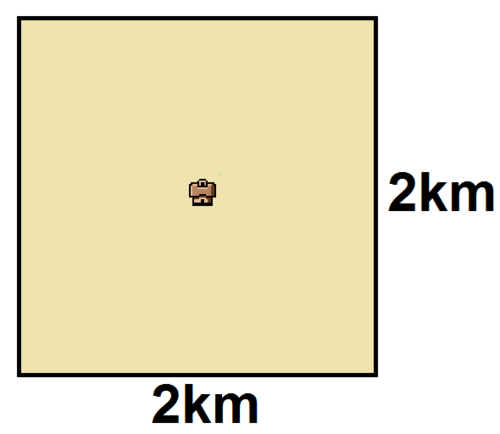Day 14: Return to the Factory
 An elf finds himself in a random place in a square field that is
by
. Right in the centre of the field is the present factory, which can be assumed to be a point.
An elf finds himself in a random place in a square field that is
by
. Right in the centre of the field is the present factory, which can be assumed to be a point.
He needs to return to the factory promptly, so he does so by walking in a straight line back to the factory (the shortest distance).
Find the root mean square average of the length of his journey, and give your answer to the nearest metre .
Note : The root mean square is also known as the quadratic mean .
This problem is part of the Advent Calendar 2015 .
The answer is 816.
This section requires Javascript.
You are seeing this because something didn't load right. We suggest you, (a) try
refreshing the page, (b) enabling javascript if it is disabled on your browser and,
finally, (c)
loading the
non-javascript version of this page
. We're sorry about the hassle.
We can use a double integral to solve this: 1 × 1 ∫ 0 1 ∫ 0 1 ( x 2 + y 2 ) d x d y = 3 2 = 0 . 8 1 6 4 … but this requires knowledge of double integrals, so here I will present a solution that only requires single integrals.
We only need to consider one quarter of the square as the situation is perfectly symmetric. Consider the top left quadrant, and let the factory be the origin ( 0 , 0 ) .
Note that the quadratic mean is given by: n l 1 2 + l 2 2 + ⋯ + l n 2 Basically we want to find the square root of the (arithmetic) mean of the squares of the lengths. Note that l 2 = x 2 + y 2 by Pythagoras' Theorem. So the above expression is equal to: n x 1 2 + x 2 2 + ⋯ + x n 2 + y 1 2 + y 2 2 + ⋯ + y n 2 Now what we want to do is to limit n to infinity as we take all values of x and y from 0 to 1 .
As x and y are perfectly symmetric we can consider them separately.
Now the mean of the x 2 terms is precisely: 1 ∫ 0 1 x 2 d x = [ 3 x 3 ] = 3 1
In a similar way the mean of the y 2 terms is 3 1 too.
Substituting in shows us that the final answer is 3 2 = 0 . 8 1 6 4 … and this gives the answer 8 1 6 as required.